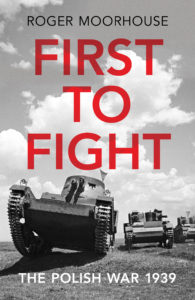‘First to Fight’ makes for genuinely persuasive reading – not least through its use of diaries and first hand testimonies: “We are not fighting for ‘inspired nations’ to calmly watch our tragedy from a distance. We are fighting for the very existence of our nation…”
Interview by Marianna Bukowski
With the publication of his latest book, ‘First to Fight: The Polish War 1939’, British historian Roger Moorhouse met with Marianna Bukowski to discuss the differences in the British and Polish narratives of the war, and the myths that still surround the Polish campaign to this day.
Many readers perhaps primarily associate you as a historian of the Third Reich and World War II Germany, however in ‘First to Fight’ your focus shifts towards Poland. What sparked your interest in Polish history? A clue can perhaps be found in the dedication of your new book?
– Indeed! I’ve dedicated the book to Norman Davies, who was my professor when I was a student, and with whom I worked for a few years, even co-authoring a book with him on the history of Wroclaw.
My interest in Poland actually predates my interest in Germany. I was inspired by the revolutions of 1989 and went to university specifically to study Central European history. So Poland has always had a particular fascination for me.
Must admit I have not read ‘Microcosm’ yet – it is still patiently waiting for me on my bookshelf… However, your interest in Poland has resulted in a new and very engaging book, which opens on the curiously Kafkaesque story of Franciszek Honiok. A man who is used as a pawn by forces infinitely stronger than himself, for a purpose over which he has no control or indeed any understanding, and whose doomed fate will have incalculable consequences…
– It does. Franciszek Honiok was the man killed in the Gleiwitz Incident, which was intended to make it look as if Polish bandits had attacked Germany. I wanted to bring him out of the shadows. For too long he has been little more than a footnote, so I wanted to flesh him out – and tell of his fate – as far as was possible. His story is also often misunderstood, so I wanted to challenge the mythology that has grown up around the Gleiwitz Incident. He deserves better than to be forever a forgotten victim.
Your book sets out to dismiss many of the myths around the Polish Campaign and Blitzkrieg that have persisted since the war. One of the most prevailing, is of course the idea of ‘cavalry charging against tanks’, which at best, can be seen as romantically quixotic, yet in reality made the Polish cavalry seem not only out-dated, but militarily incompetent, creating an image of the Poles as an unreliable ally…
– Yes. Its more than that actually. The story was originally picked up by the Germans from a report by an Italian journalist who saw the aftermath of an engagement during the Battle of the Bzura. Portraying the Poles as hopeless romantics, charging tanks with their cavalry, was a way not only of emphasising the technological superiority of German forces, but also showing their racial superiority. Of course, it never happened as they described it. Polish cavalry fought dismounted, and could be remarkably effective.
Yet this is only one of many different misconceptions, which originally stem from German wartime propaganda, that are continuously repeated by many historians and commentators today…
– Yes, both German and Soviet propaganda actually. There are a few examples; like that the Polish airforce was destroyed on day 1, of course it wasn’t and fought on – despite being outgunned – well into the second week of the campaign, accounting for some 200 enemy aircraft. Or the Soviet lie that the Red Army didn’t invade Poland at all! These are all myths that we need to put to bed once and for all.
Indeed. Especially as we currently live in times when Putin’s Russia is still peddling that particular lie. Returning to your book, I believe you are also making the argument that the very idea of “Blitzkrieg”, as this unstoppable force, is not entirely correct either? In some instances the Polish defence and counter offensives were surprisingly effective. The battle of Wizna and the defence of Modlin make for genuinely compelling reading…
 – Yes. It’s been said before, of course, but it is clear from the Polish Campaign that Blitzkrieg was not being utilized anything like consistently in 1939. It was still in the process of being properly thought out as a military doctrine. So, the idea that Germany rolled in with this unstoppable force, with all its forces in tanks and trucks, and that they simply crushed Polish forces is – again – the product of German propaganda.
– Yes. It’s been said before, of course, but it is clear from the Polish Campaign that Blitzkrieg was not being utilized anything like consistently in 1939. It was still in the process of being properly thought out as a military doctrine. So, the idea that Germany rolled in with this unstoppable force, with all its forces in tanks and trucks, and that they simply crushed Polish forces is – again – the product of German propaganda.
Now, that is not to suggest that the result was any different, or that Polish forces weren’t outgunned – they were. It is just to make note of the fact that the myth – yet again – has become larger than the reality. The reality was that; at places like Mokra, Mława, Wizna, on the Bzura and elsewhere, the Poles fought very well.
– Indeed, it is instructive to note that the British and French – for all their supposed military might and technological prowess – held out for 6 weeks in 1940, while the Poles held out for 5 weeks, and that was against the Germans AND the Soviets!
Of course what the British refer to as the “Phoney War” – was an all too real war in Poland – poignantly marked in your book through the words of one defender, Ludwik Czyżewski; “We are not fighting for ‘inspired nations’ to calmly watch our tragedy from a distance. We are fighting for the very existence of our nation…”
– Yes. And that’s very much the shift of emphasis that I want this book to achieve. It is mad that we in Britain still talk about the Phoney War – a war in which not much happened – when, at the same exact time, Poland was fighting for its life! We really need to shift the British narrative to get away from this lazy Anglocentric myth.
It is quite striking as well, that in Britain, it seems that peoples’ general understanding of “German occupation” is solely based on the conditions in Occupied France and Western Europe. In addition to which, on occasion, there’s also the narrative of the ‘innocence’ of the ‘regular’ German soldier, which suddenly seems to disregard years of pre-war conditioning of the Germans’ sense of racial superiority and their perceived need for ‘lebensraum’ in the East. This perception often creates a sharp and at times very conflicting contrast to the reality in Poland. It is often difficult to impress upon people just how brutal and violent the conditions were from the very start of the invasion in Poland, where German ‘reprisal’ killings and mass executions of the civilian population began at the very outset – and would escalate to an unprecedented scale as the war continued.
– I think that’s right, and it’s another aspect that I wanted to bring out in the book. It is incredible to me that some of us in the west still have an image of German forces as in some way chivalrous in their treatment of occupied populations, at least in the early phase of the war. This is certainly down to the very different way in which German forces behaved in occupied France versus how they behaved in the eastern half of the continent.
It’s worth reiterating that the Germans brought race war to Poland – already in 1939 – and that the treatment meted out to Polish civilians and PoWs was little short of genocidal. And it was not the SS that was doing this, it was predominantly the ordinary soldiers of the Wehrmacht. That was the reality. And it is a reality that we in the west have to understand if we are to properly understand what World War Two was all about.
Absolutely. Unfortunately, I often find that many other British WWII historians seem to shy away from Polish sources. What kind of original Polish material did you use in your research? And do you feel that your work has given you a reason and interest to learn the Polish language?
– I already had an interest in learning Polish! I’ve been trying on and off for a few years!
Great – For your next book we’ll do the interview in Polish!
– Ha! Don’t hold your breath! But yes, I think you are right. Western historians generally tend to shy away from Polish sources, and it is just laziness really. It is quite normal to use local research assistance on projects such as this, and to try to write about this subject without consulting Polish archives and written sources is just plain lazy. My researcher Anastazja and I visited a number of sites and archives together, and she visited many more alone. Consequently, the book is full of accounts from Polish soldiers and civilians, many of which have never been published before. I really wanted to put the Polish “voice” back in to the narrative of the September Campaign, and I hope I have achieved that.
I’m curious if perhaps there was some moment during your research or writing of this book that you remember which stands out that moved or surprised you in some way?
– Yes, a few, particularly among those ‚voices’; the accounts of ordinary people caught up in this maelstrom. Some of them linger in my mind – Alexander Polonius was a particularly eloquent eye-witness to events, or the righteous anger of Konstanty Peszyński, or Stefan Starzyński’s principled defiance… There are so many stories here, so many characters.
The individual perspectives are striking in your book and the way in which you put them against the wider backdrop of the war, was often very moving, at times heart-breaking even, such as in the contrast between the diary entry of a 10 year old girl, hopefully awaiting the British soldiers she believes are coming to Poland’s defence – against the reality of Britain’s war declaration, following the invasion of Poland, which in effect is nothing more than an extension of Chamberlain’s continuous appeasement policy.
– Yes, I think one always has to humanise history. You need to tell the wider story and the political, military and diplomatic aspects, of course, but at heart it has to be a human story. I am not a military historian, and honestly I find most military history rather dull, so I wanted to write a history here that I would find interesting. So I suppose it one could describe it as a human history of a time of war.
From a Polish viewpoint this would be the first, in a series of betrayals of Poland, followed by Britain’s denial of Soviet responsibility for the Katyń massacre and the later conference at Yalta… Ultimately, whilst Britain declared war on Germany, it left Poland to its fate under the Soviets. Britain’s silence and agreement with the Soviet Union, has in some ways also left a hole in many Brits understanding of the war today.
– I agree. And one must remember that the British narrative of World War Two is a profoundly moral one. We were on the side of the angels, we sacrificed our empire and our position in the world to “do the right thing”. So it is difficult to incorporate within that moral landscape, such profound failings as those that were committed in dealing with Poland. Add to that the simple British myopia of Poland being another “far away place about which we know little” – as Chamberlain said of Czechoslovakia – and you can see how so many Britons still have almost no understanding of Poland’s role in World War Two, and the huge extent of its suffering. Hopefully we can begin to change that.
Yes – and this is a very fascinating subject: the vast difference in narratives, where in Britain, and indeed America, the war is seen in terms of a victory of good over evil, whereas for Poland, the war was always against two totalitarian aggressors.
– Absolutely, and if we are serious about having a comprehensive understanding of World War Two – or indeed anything beyond the rather silly parochial, ‚chocolate box’ understanding that we have at the moment – then we have to take some of that Polish perspective into account.
Your previous book ‘The Devils’ Alliance’, on the German-Soviet Pact – also touches on this subject, which still often comes as a surprise to many Brits, to whom the Soviet invasion of Poland on the 17th of September remains largely unknown, despite it not only being fundamental to understanding the start of World War Two – but also to understand the devastating consequences for half of Europe trapped behind the Iron Curtain in the years that followed.
– Yes, I’m attracted to these areas of history that we – in the west at least – seem to have forgotten about. The Nazi-Soviet Pact is a good example. It is also an example of why we desperately need to change the lazy western narrative of the war. We are wallowing in our own ignorance.
This of course makes ‘First to Fight’ an all the more important publication and not only in Britain – but for all countries, with their own different narratives and understanding of the war. And whilst the battles raging from Westerplatte to Kock are well known in Poland, ‘First to Fight’ still makes for genuinely persuasive reading – not least through its use of diaries and first hand testimonies beautifully interwoven against the vast and devastating scale of the war, giving an important perspective and a sense of true immediacy to the events that shaped Europe 80 years ago.
Roger Moorhouse’s book ‘First to Fight: The Polish War 1939’, published by Bodley Head, is out now. The Polish version is published by Znak, under the title ‘Polska 1939’.
 Marianna Bukowski: Independent Filmmaker, Director and Producer of ‘Portrait of a Soldier’. Feature article writer on Polish History for British magazines, and currently working on two forthcoming screen plays.
Marianna Bukowski: Independent Filmmaker, Director and Producer of ‘Portrait of a Soldier’. Feature article writer on Polish History for British magazines, and currently working on two forthcoming screen plays.













